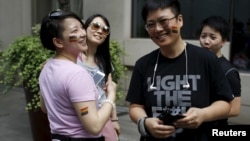Ninety-five percent of lesbian, gay and other sexual and gender minorities in China hide their orientation because they fear discrimination and social abuse, according to the United Nations Development Program (UNDP).
Discrimination against gay people and other sexual and gender minorities is not just restricted to education and the workplace but extends to official agencies and the judiciary, the U.N. body said after a major survey covering 30,000 people.
The report comes a week after a Chinese court rejected the first gender discrimination suit filed by a transgender person, identified as Mr. C, who complained he was fired from his job because of his self-identification. Mr. C’s employer told the labor court that the plaintiff's manner of dressing would negatively affect the firm.
Chinese censors recently removed a video about transgender people from the Internet, while Chinese filmmaker Zhang Wei complained he was finding it difficult to make China's first movie on the subject.
"Physical and emotional violence is still a reality, especially within the family," the UNDP report said. "Discrimination continues to cost LGBTI [lesbian, gay, bisexual, transgender, intersex] people jobs, lower their career prospects and their learning potential in schools. Sexual and gender minorities suffer from lower job stability and higher unemployment rates."
Government criticized
The U.N. body also was critical of the government. "China still lacks policies or laws that recognize sexual and gender minorities or protect them from discrimination and unfair treatment on the basis of their gender identity or sexual orientation," it said.
The Chinese Ministry of Justice recently told the United Nations that “China does not view LGBTI as a mental disease or require compulsory treatment for LGBTI people. They will not be confined in mental hospitals either.”
But the ministry acknowledged some problems. "Indeed, LGBTI people face some real challenges in terms of social acceptance, employment, education, health and family life," it admitted.
The UNDP found that gender diversity concerns are rarely covered in staff training and internal regulations of government offices and government-backed organizations.
Only about 5 percent of gender minorities disclose their sexual orientation outside their families. Even within the family, "no more than 15 percent have the courage to do so," the report said.
Response on social media
Chinese social media greeted Tuesday’s release of the report with some calls for better treatment for LGBTI people and others questioning why the issue even comes up.
"Finally, attention is being paid to the living conditions of homosexuals!" said a social media commentator who goes by the user name seby1989.
One user on Sina Weibo, the country's most followed Twitter-like platform, called for a referendum on whether LGBTI people should have protection and support in China, and asked the United Nations to help organize it.
Another one, named MXAU, promised “to promote the legalization of same-sex marriages."
Critical comments came from a user who said, "Chinese will only pretend. But all [people] don't want to see it," adding that legalizing gay marriage would be ridiculous.
In China, relatives often pressure LGBTI people to undergo electric shock "conversion therapies," under the mistaken belief that such “treatment” might make them "straight." Therapies also include painful and expensive surgeries or a series of injections that leave patients weak and disoriented.
"Family pressure and rejection can have more serious consequences, with some LGBTI people being forced into psychotherapy and sometimes even ‘conversion therapy,’" UNDP said.
It said most gender minorities enter into heterosexual relationships, sometimes dubbed “cooperation marriages."
Outlook improving
But there is hope for LGBTI people. Younger Chinese take a more liberal approach and largely accept the fact of gender diversity, the UNDP survey suggested.
"The younger the respondents, the higher the proportion of those opposed to the pathological view of homosexuality, stereotype-based prejudices, gender binary ideas and even HIV-related stigma," it said.
Among respondents to the survey, the highest proportion of those who said they would accept their own children as being LGBTI were young people.
"Overall, it is clear that generational change represents the greatest opportunity for social emancipation of sexual and gender minorities in China." the report said.




